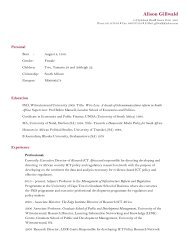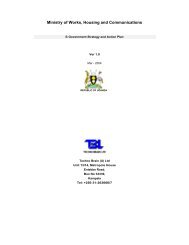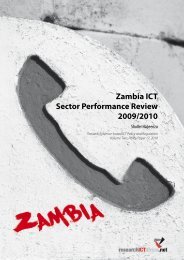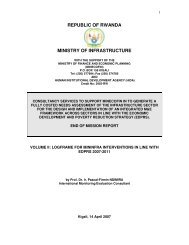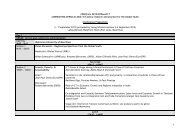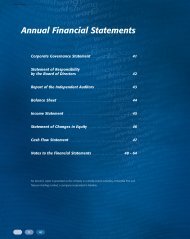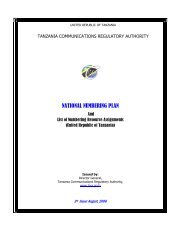Benin Telecommunications Sector Performance Review 2007
Benin Telecommunications Sector Performance Review 2007
Benin Telecommunications Sector Performance Review 2007
Create successful ePaper yourself
Turn your PDF publications into a flip-book with our unique Google optimized e-Paper software.
<strong>Benin</strong><br />
Box 1: Five pillars<br />
of ICT policy in<br />
<strong>Benin</strong><br />
1. Institutional<br />
policy: Provide a<br />
favourable institutional<br />
environment<br />
for capacity<br />
building and the<br />
general supervision<br />
of the activities<br />
of the sector.<br />
2. Regulatory policy:<br />
Provide an<br />
enabling legal and<br />
regulatory environment<br />
for defining<br />
and implementing<br />
governing<br />
principles.<br />
3. Infrastructural<br />
policy: Develop<br />
and maintain<br />
basic telecommunications<br />
infrastructure.<br />
4. Investment policy:<br />
Promote a conducive<br />
environment<br />
for<br />
investment and<br />
encourage competition<br />
in the NICT<br />
sector.<br />
5. Policy on use:<br />
Promote creativity<br />
in content creation<br />
and encourage the<br />
use of technologies.<br />
1) An institutional policy that guarantees an enabling regulatory and<br />
legislative environment for the development of NICTs;<br />
2) A policy on the development of basic infrastructure needed for these<br />
technologies to penetrate all spheres of national life;<br />
3) A policy on the development of human resources commensurate with<br />
the ambition of this policy, the players and beneficiaries of the<br />
expected changes;<br />
4) A policy on the development of NICT sectoral applications; and<br />
5) A policy on regional and international cooperation resolutely committed<br />
to supporting this ambition through a redeployment of southsouth<br />
and north-south cultural exchange for the benefit of <strong>Benin</strong>.<br />
THE INSTITUTIONAL ENVIRONMENT<br />
Since 1988, the legal and regulatory environment in <strong>Benin</strong> has been evolving<br />
towards the liberalisation of the telecommunications sector, in particular<br />
through the opening of some activities of the incumbent operator to<br />
competition. Liberalisation measures became effective in 1999 when GSM<br />
licences were granted to three operators (Libercom, Areeba and Moov)<br />
and to a fourth operator in 2003 (Bell <strong>Benin</strong> Communications).<br />
To date, there is no operational entity that is specifically responsible for<br />
the regulation of ICTs. This regulatory function is performed by the government<br />
through the MDCCNT/PR. Multiparty committees are sometimes<br />
set up within Bénin Télécoms SA and the MDCCNT/PR, in order to<br />
resolve conflicts related to telecommunications. This situation, and<br />
especially reforms in this sector, pushed the government to sign two ordinances<br />
on 31 January 2002 during the extraordinary session of the Cabinet.<br />
They include Ordinance No. 2002-002 to define the fundamental<br />
principles governing telecommunications and Ordinance No. 2002-003 to<br />
set up and define the duties of the Posts and <strong>Telecommunications</strong> Regulatory<br />
Authority (ARPT). The ordinance to define the fundamental principles<br />
governing telecommunications services also sets out the general<br />
regulations governing service delivery management in the telecommunications<br />
sector. It also endorses the liberalisation of the telecommunications<br />
sector, defines the general regulations for fair competition (management<br />
of the frequency spectrum, transparent procedures in the<br />
distribution of resources, restriction of monopoly, etc). The ordinance<br />
also regulates services, the mode of protecting the interests of the State<br />
(defense, national security) and users (including the principle of universal<br />
access, the quality of service, etc) as well as the encoding method (or<br />
encryption method). The ordinance does not address a specific service<br />
or a particular domain. Achieving this will require enabling regulations<br />
once the organisation has been set up. The deadline of 31 December 2005<br />
was set for the liberalisation of all telecommunications services. In spite<br />
of this decision the Regulatory Authority is still to become operational.<br />
This situation is the source of some difficulty relating to the organisation<br />
and the smooth operation of the sector, namely lateness in the issuance<br />
of decrees in respect of the application of the 2002 Orders, non-compliance<br />
with the procedures governing the granting of operating licences to<br />
GSM operators and to ISPs, breach of contractual commitments by operators,<br />
etc.<br />
14 <strong>2007</strong> <strong>Telecommunications</strong> <strong>Sector</strong> <strong>Performance</strong> <strong>Review</strong>



